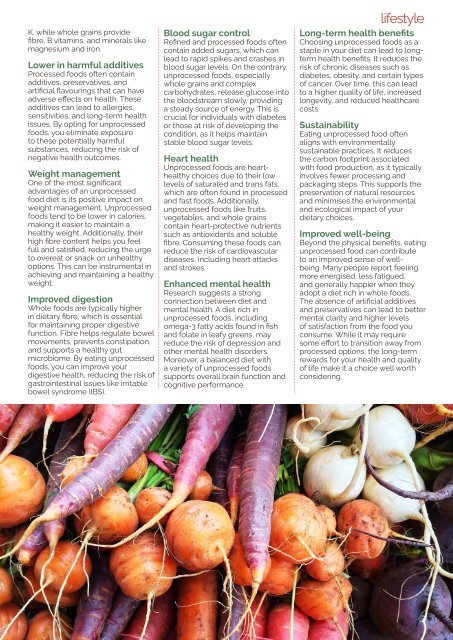Whitchurch and Llandaff Living Issue 68
Issue 68 of the award-winning Whitchurch and Llandaff Living magazine.
Issue 68 of the award-winning Whitchurch and Llandaff Living magazine.
Create successful ePaper yourself
Turn your PDF publications into a flip-book with our unique Google optimized e-Paper software.
K, while whole grains provide<br />
fibre, B vitamins, <strong>and</strong> minerals like<br />
magnesium <strong>and</strong> iron.<br />
Lower in harmful additives<br />
Processed foods often contain<br />
additives, preservatives, <strong>and</strong><br />
artificial flavourings that can have<br />
adverse effects on health. These<br />
additives can lead to allergies,<br />
sensitivities, <strong>and</strong> long-term health<br />
issues. By opting for unprocessed<br />
foods, you eliminate exposure<br />
to these potentially harmful<br />
substances, reducing the risk of<br />
negative health outcomes.<br />
Weight management<br />
One of the most significant<br />
advantages of an unprocessed<br />
food diet is its positive impact on<br />
weight management. Unprocessed<br />
foods tend to be lower in calories,<br />
making it easier to maintain a<br />
healthy weight. Additionally, their<br />
high fibre content helps you feel<br />
full <strong>and</strong> satisfied, reducing the urge<br />
to overeat or snack on unhealthy<br />
options. This can be instrumental in<br />
achieving <strong>and</strong> maintaining a healthy<br />
weight.<br />
Improved digestion<br />
Whole foods are typically higher<br />
in dietary fibre, which is essential<br />
for maintaining proper digestive<br />
function. Fibre helps regulate bowel<br />
movements, prevents constipation,<br />
<strong>and</strong> supports a healthy gut<br />
microbiome. By eating unprocessed<br />
foods, you can improve your<br />
digestive health, reducing the risk of<br />
gastrointestinal issues like irritable<br />
bowel syndrome (IBS).<br />
Blood sugar control<br />
Refined <strong>and</strong> processed foods often<br />
contain added sugars, which can<br />
lead to rapid spikes <strong>and</strong> crashes in<br />
blood sugar levels. On the contrary,<br />
unprocessed foods, especially<br />
whole grains <strong>and</strong> complex<br />
carbohydrates, release glucose into<br />
the bloodstream slowly, providing<br />
a steady source of energy. This is<br />
crucial for individuals with diabetes<br />
or those at risk of developing the<br />
condition, as it helps maintain<br />
stable blood sugar levels.<br />
Heart health<br />
Unprocessed foods are hearthealthy<br />
choices due to their low<br />
levels of saturated <strong>and</strong> trans fats,<br />
which are often found in processed<br />
<strong>and</strong> fast foods. Additionally,<br />
unprocessed foods like fruits,<br />
vegetables, <strong>and</strong> whole grains<br />
contain heart-protective nutrients<br />
such as antioxidants <strong>and</strong> soluble<br />
fibre. Consuming these foods can<br />
reduce the risk of cardiovascular<br />
diseases, including heart attacks<br />
<strong>and</strong> strokes.<br />
Enhanced mental health<br />
Research suggests a strong<br />
connection between diet <strong>and</strong><br />
mental health. A diet rich in<br />
unprocessed foods, including<br />
omega-3 fatty acids found in fish<br />
<strong>and</strong> folate in leafy greens, may<br />
reduce the risk of depression <strong>and</strong><br />
other mental health disorders.<br />
Moreover, a balanced diet with<br />
a variety of unprocessed foods<br />
supports overall brain function <strong>and</strong><br />
cognitive performance.<br />
lifestyle<br />
Long-term health benefits<br />
Choosing unprocessed foods as a<br />
staple in your diet can lead to longterm<br />
health benefits. It reduces the<br />
risk of chronic diseases such as<br />
diabetes, obesity, <strong>and</strong> certain types<br />
of cancer. Over time, this can lead<br />
to a higher quality of life, increased<br />
longevity, <strong>and</strong> reduced healthcare<br />
costs.<br />
Sustainability<br />
Eating unprocessed food often<br />
aligns with environmentally<br />
sustainable practices. It reduces<br />
the carbon footprint associated<br />
with food production, as it typically<br />
involves fewer processing <strong>and</strong><br />
packaging steps. This supports the<br />
preservation of natural resources<br />
<strong>and</strong> minimises the environmental<br />
<strong>and</strong> ecological impact of your<br />
dietary choices.<br />
Improved well-being<br />
Beyond the physical benefits, eating<br />
unprocessed food can contribute<br />
to an improved sense of wellbeing.<br />
Many people report feeling<br />
more energised, less fatigued,<br />
<strong>and</strong> generally happier when they<br />
adopt a diet rich in whole foods.<br />
The absence of artificial additives<br />
<strong>and</strong> preservatives can lead to better<br />
mental clarity <strong>and</strong> higher levels<br />
of satisfaction from the food you<br />
consume. While it may require<br />
some effort to transition away from<br />
processed options, the long-term<br />
rewards for your health <strong>and</strong> quality<br />
of life make it a choice well worth<br />
considering.<br />
7

















